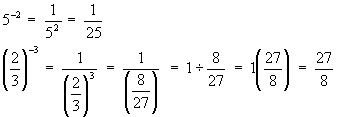Zero and Negative Exponents
Motivational ExampleWe know any nonzero number divided by itself is equal to 1. Furthermore, when we divide exponentials with the same base we subtract the exponent on the denominator from the exponent on the numerator. Thus if x is not equal to zero,
Definition: If x is a real number, x not equal to zero,
Examples:(2x)° = 1 2x° = 2(1) Motivational example:Consider
Note when you reduce you get 1/x³. If you use law IV you get the following
Thus Definition: If x is not equal to zero and n is a positive integer,
Examples: Remark: All laws of exponents hold for integer exponents. It matters not whether they are positive, zero, or negative. Examples:
Copyright © 1995 - Present. SSmyrl
|

